Children's Book Sizes, Layout and Paper Choices for Printing

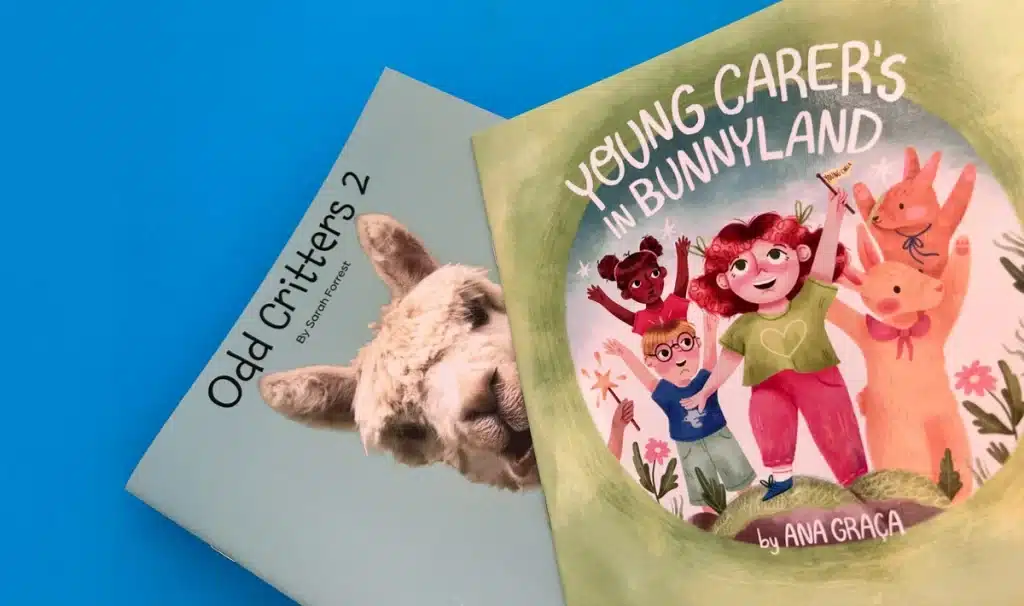
Creative solutions for Children’s Book Printing
Let us begin with guiding you through the children's book printing sizes, layout and paper choices you can choose for your project. We try not to restrict you in any way apart from what the physical impossibilities are. Our ethos at Ex Why Zed is “The answer is Yes, now what is the question?”.

So impressive! Everything worked brilliantly with Ex Why Zed. From now on they will always be my chosen printer. I can’t see how anyone could improve on them!
Waldemar Januszczak. Self-Publisher, Art Critic and TV Producer.
Key Takeaways on Children's Book Sizes
Portrait Stapled Booklet
(also known as wire stitched and saddle stitched)
• Choose any size from A6 (148x105mm) up to a massive A3 (420x297mm).
• Pricing Hack>>> There is a price break at A4 (297x210mm). Any size larger than A4 is in the next bracket up and has to be printed on our B2 press. So if you are going for a small print run, say under 100 copies, then A3 can be expensive per copy.
Portrait Perfect Bound
• Choose any size from A6 to A4.
• You need an absolute minimum or 32 pages to make the spine thick enough to glue.
Portrait Hardcover (Case Bound, Hardback)
• Choose any size from A6 to A4.
• You need an absolute minimum of 28 pages inside pages, plus the front cover, back cover and you also have the option of printing the 3 'end paper' sides at the front and back of the book too.
Check out our quick video on the process of making a hardback book to learn where the endpapers are positioned.
Square Staple Bound (wire stitched)
• Choose any size from 148x148mm up to 297x297mm.
• Pricing Hack>>> There is a price break at 210x210mm and any square larger than 210mm is in the next price bracket up.
Square Perfect Bound
• Choose any size from 148x148mm up to 297x297mm.
• Again, there is a price break at 210x210mm.
Square Hardcover (Case Bound, Hardback)
• Choose any size from 148x148mm to 294x294mm and once again, there is a price break at 210x210mm.
Landscape Staple Bound (wire stitched)
• Choose any size from A5 (148mm high x 210mm wide) up to A4 (210mm high x 297mm wide)
• Pricing Hack. There is a price break at A5 (297x210mm) so if you are printing a smaller number of copies (under 100) then A4 Landscape can be expensive per copy.
Landscape Perfect Bound
• Choose any size from A5 to A4.
Landscape Hardcover (Case Bound, Hardback)
• Choose any size from A5 to A4.
Chat with Harriet or Mike about your Book Printing project
Start a conversation on hello@exwhyzed.com or 01206 766647

Quick Links
Lets get you some help to move your project forward. (Or do continue reading this page for stacks more information)
Portrait Book Printing Size Options
Portrait children's books are an excellent choice for combining vibrant illustrations, educational content, and storytelling. The versatility of portrait formats allows for both standard and custom sizing, offering flexibility to meet different design goals. A5-sized books (210×148mm) remain a popular option due to their compact nature and cost-effective printing. This size strikes a perfect balance between portability and readability, making it ideal for young readers.
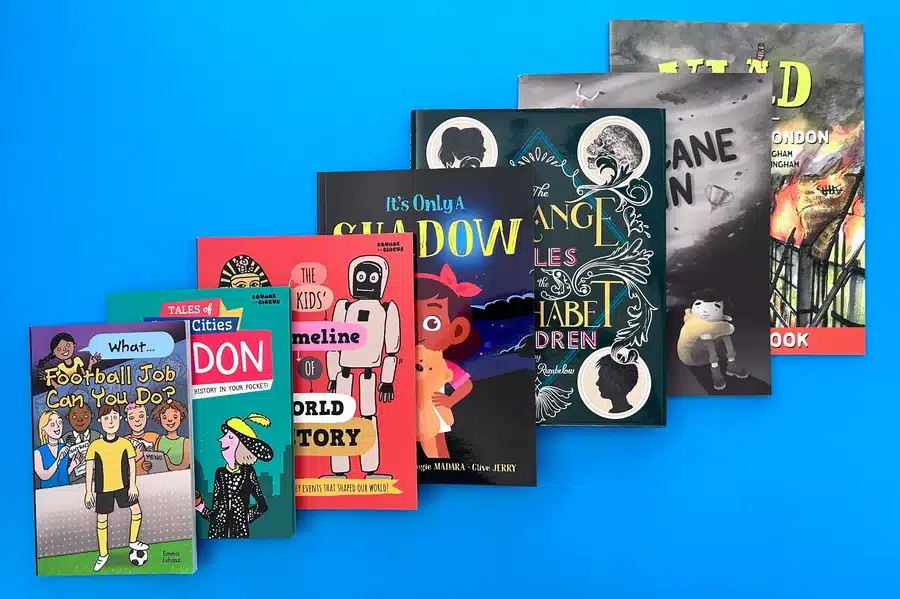
However, custom-sized portrait books open up new possibilities for creative expression. For instance, "What Football Job Can You Do?" by Emma Juhasz, printed in a handy 198x129mm format, demonstrates how a smaller, pocket-sized book can be engaging and interactive, perfect for children to carry around. "Tales of Great Cities London" uses a slightly shorter height (180mm) to create a compact yet informative book, utilising infographic-style designs to present historical facts in an accessible way.
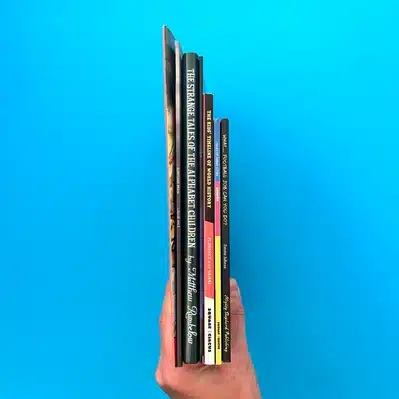
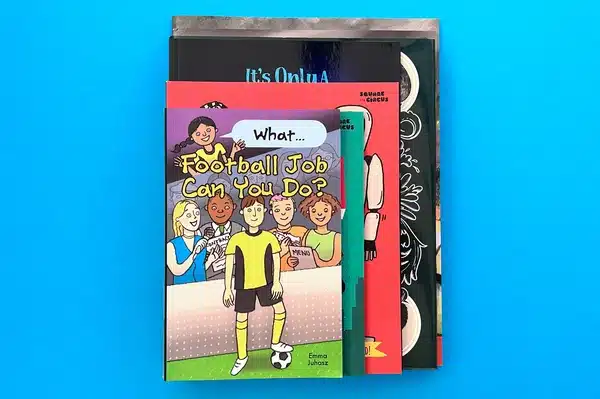
Larger custom portrait sizes, like "Vlad and the Great Fire of London" (280x216mm), provide a more expansive canvas for detailed illustrations and in-depth storytelling. This larger format allows for immersive visual experiences, which is particularly effective for books that blend history with narrative, making events like the Great Fire of London more engaging for young readers. Similarly, "Hurricane Brain" (270x210mm) takes advantage of a slightly smaller, but still substantial, portrait format, offering enough space for intricate artwork while remaining easy to handle. These varied custom sizes allow designers and authors to tailor their books precisely to the content, providing a unique reading experience that stands out from standard formats.
A5 is a medium, compact children’s book size.
The A5 dimensions are 210×148mm. The page size is plenty large enough for your content to be legible and this is a cost-effective and standard size for precision print.
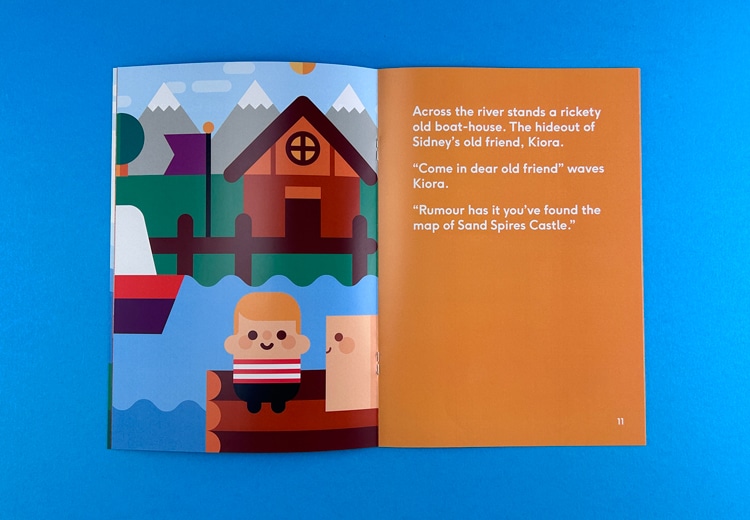
Custom Size Portrait Book Options
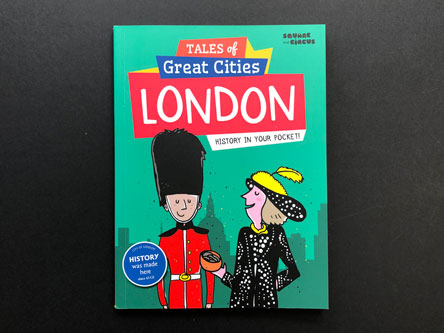
Alternatively, you could make the publication more unique by shaving a few of millimetres off the height to make it 180mm high and 148mm wide which they have done here on Tales of Great Cities London. This is a superb example of infographic printing enabling youngsters to learn and expand their knowledge through reading a larger book.
Emma Juhasz's What Football Job Can You Do? is an innovative book and more than a collection of facts. It's a fun, interactive journey filled with illustrations, games, and fascinating insights about football. It's an educational tool that keeps children engaged while nurturing their passion for the beautiful game. The custom children's book size of 198x129mm is a handy pocket book companion.
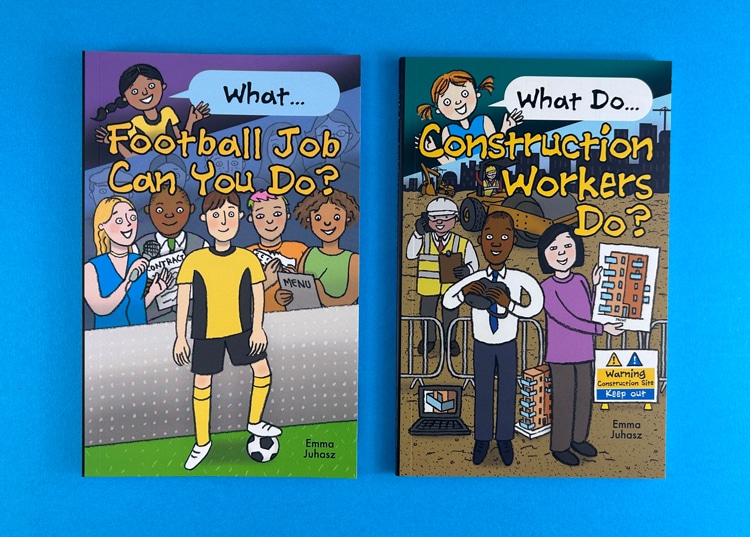
Ask your graphic designer to come up with a bespoke size and we can print all custom options so if you did want to go for something off-kilter that is fine.
Square Book Printing Options
Square children's books offer a visually appealing and balanced format, ideal for creating immersive and engaging experiences for young readers. The square shape provides a perfect canvas for designers to experiment with layouts, allowing illustrations and text to be evenly distributed across the page. This versatility makes square books suitable for both narrative-driven stories and educational content.
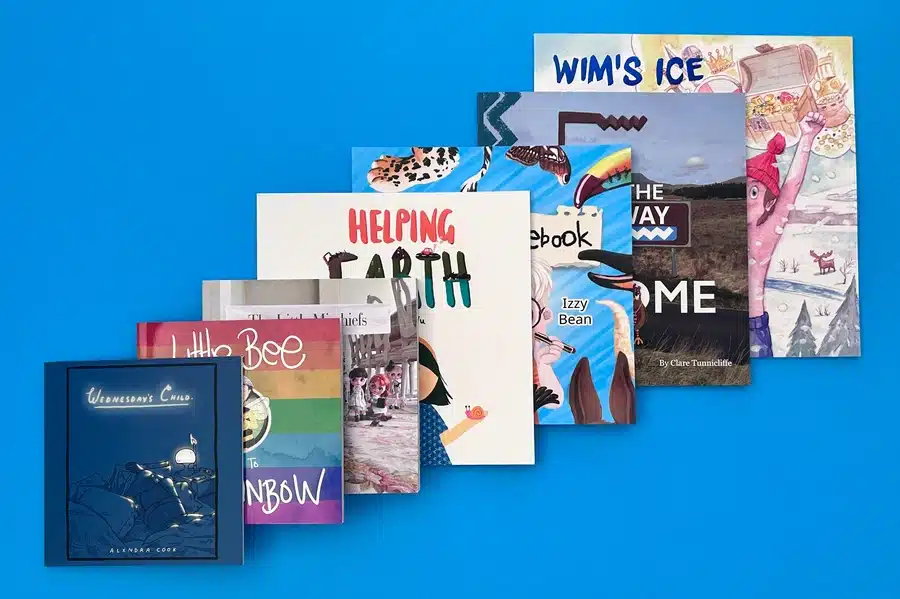
Larger square books, such as "Wim's Ice Odyssey" (216x216mm) and "Helping Earth" (210x210mm), showcase how this format can be used effectively to deliver vivid illustrations and educational themes. "Wim's Ice Odyssey" takes advantage of its larger size to present detailed, expansive artwork, which helps immerse readers in the story's adventures. Similarly, "Helping Earth" uses the square layout to integrate informative text with vibrant illustrations, making complex environmental topics accessible and engaging for children.
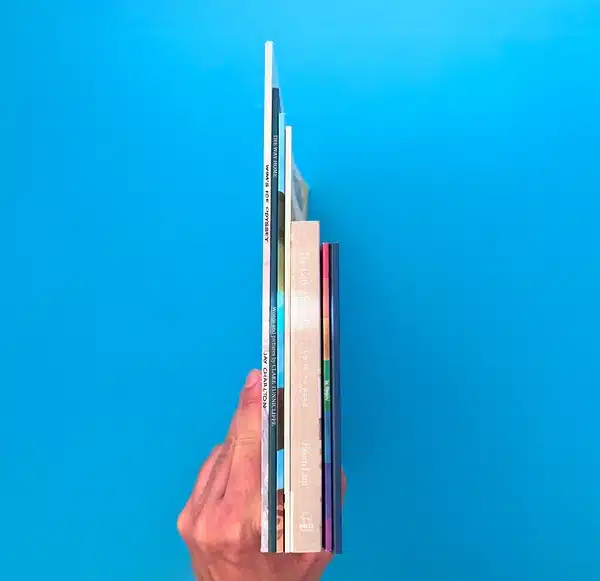
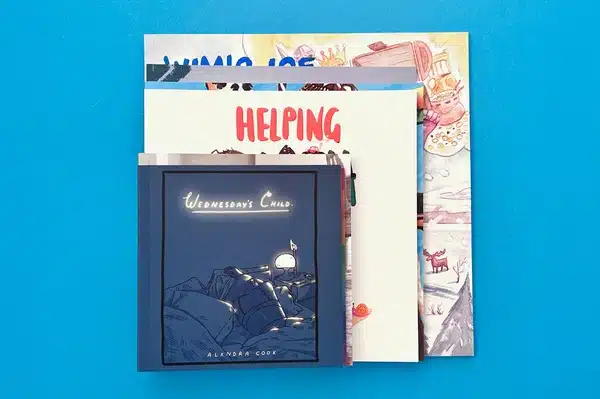
The smaller, compact square books like "Wednesday's Child" emphasise a more intimate storytelling approach, where the balanced design and concentrated visuals create a focused and cohesive reading experience. Designers should consider the overall balance of content on each page, adapting the space to enhance the storytelling or educational narrative. Square books offer a unique edge over other styles by combining visual appeal with functional design, ensuring that each page captivates and maintains the reader's attention.
The Little Bee books shown here are 148x153mm (so slightly off-square). You can see the series, each with a similar styling and the same size to breed familiarity and consistency throughout the set.
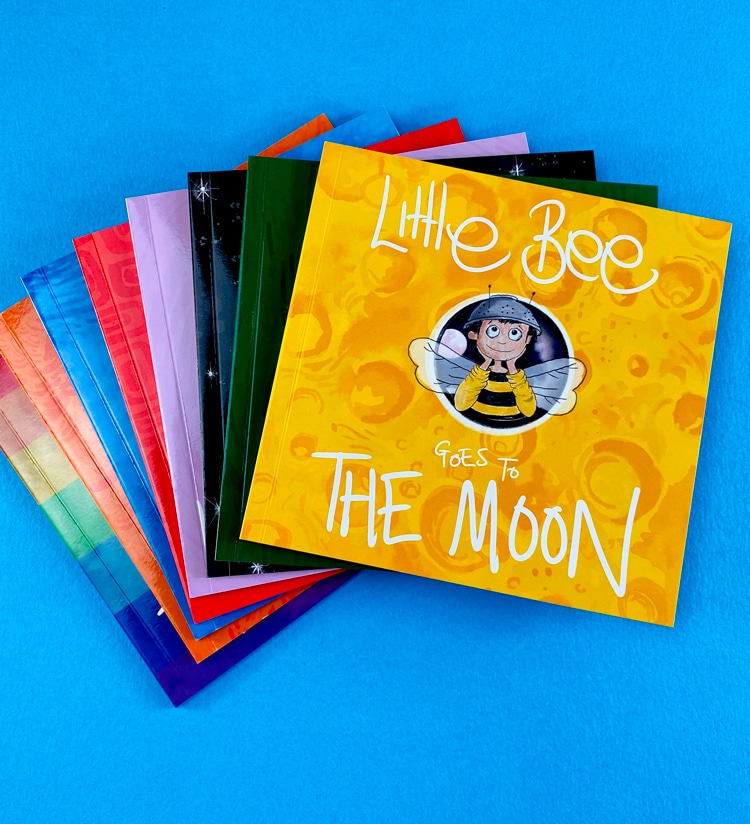
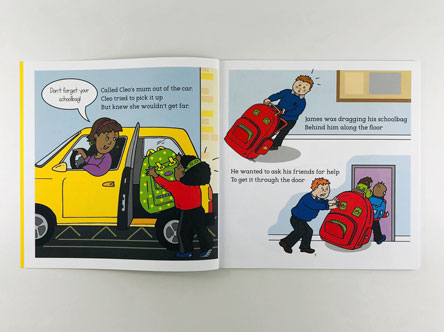
Pouch’s Magical Worry Cheeks, shown below, is 210x210mm. Gloss Lamination on the front cover and uncoated inside pages make for a nice contrast – the bright colours on the front cover and the more tactile feel of the interior.
Rodney Matthews book is a reprint of a publication first published in the late 70s
(You can still buy a copy on Amazon).
Rodney opted for an imposing 240x240mm square size in hardback. This gives you a huge double-page spread of 480x240mm. We can even print as large as 295x295mm on square hardback and soft back, perfect bound or wire stitched children’s book. These options create a super impressive finished piece.
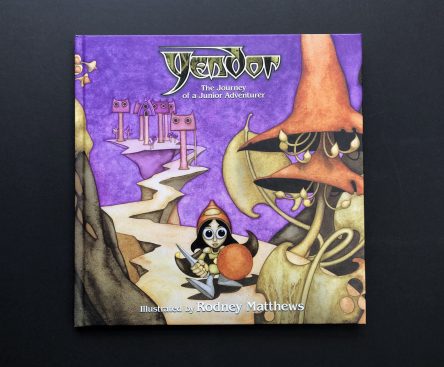
Landscape Book Size Options
Landscape children's books are an excellent choice for designs that benefit from a wider format, such as books with panoramic illustrations, educational layouts, or interactive storytelling. The A5 landscape size (210×148mm) is a compact yet spacious format, providing a great balance between portability and readability. An example of this is "Flo The Fish," which uses the A5 landscape format to bring a fun, vibrant underwater world to life, making the content engaging and easy for young readers to follow.
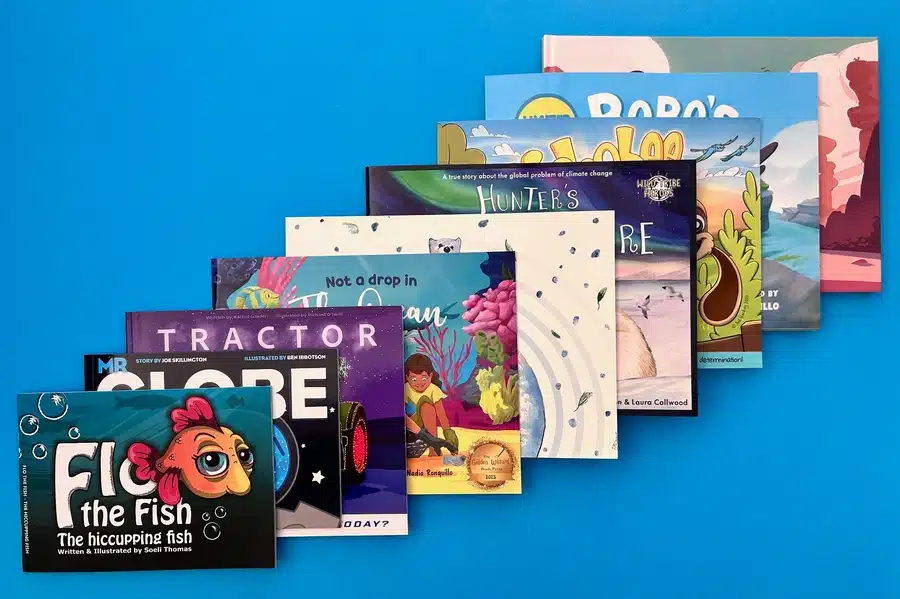
Custom landscape sizes allow for even greater creativity. "Not A Drop in the Ocean," with dimensions of 203x254mm, utilises the broader canvas to integrate illustrations and text seamlessly, making it perfect for educational stories that require more visual space. Larger formats, like the A4 (210x297mm) landscape hardback "Radio Jones," offer even more room for detailed artwork and in-depth storytelling, creating an immersive experience for readers.
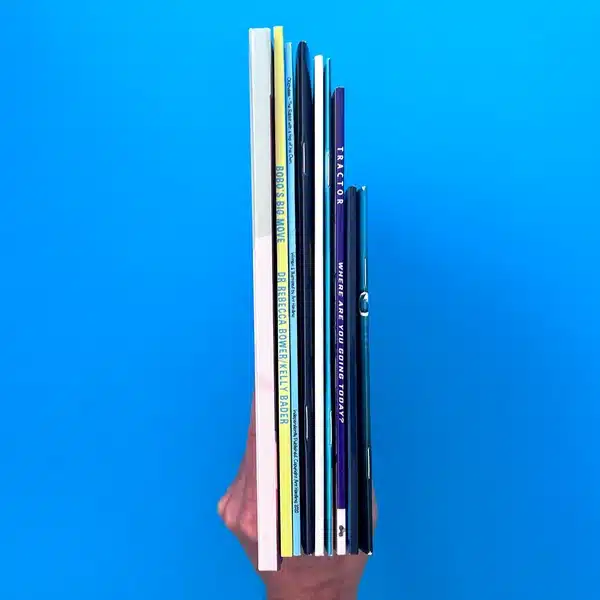
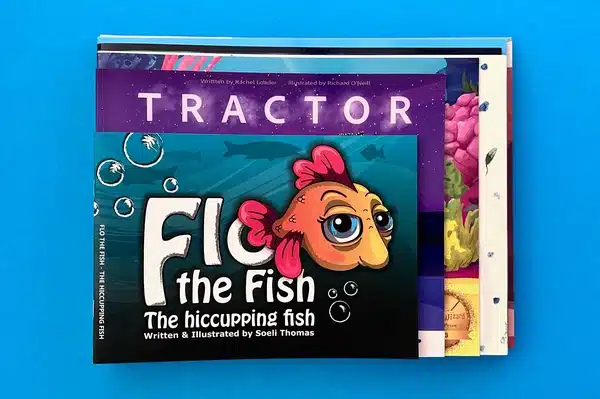
Additionally, the flexibility to print between A5 and A4 or go for custom sizes like the US Letter (216x279mm) or Wild Tribe Heroes’ 210x272mm option, opens up a myriad of possibilities. Designers can experiment with layouts that are wide and visually rich, ensuring that each book stands out on the shelf. The landscape orientation's unique appeal lies in its ability to showcase artwork and diagrams that stretch across the pages, making it ideal for educational books, illustrated stories, and visually captivating narratives.
A5 is a medium, compact children’s book size.
The A5 dimensions are 210×148mm. The page size is plenty large enough for your content to be legible and this is a cost-effective and standard size for precision print.
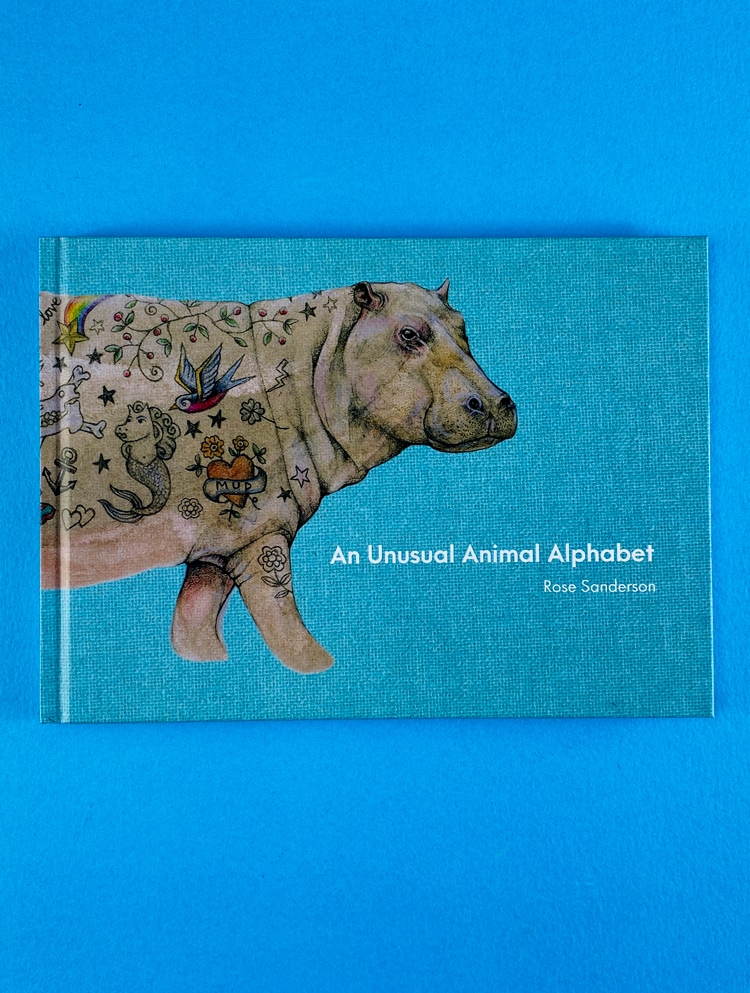
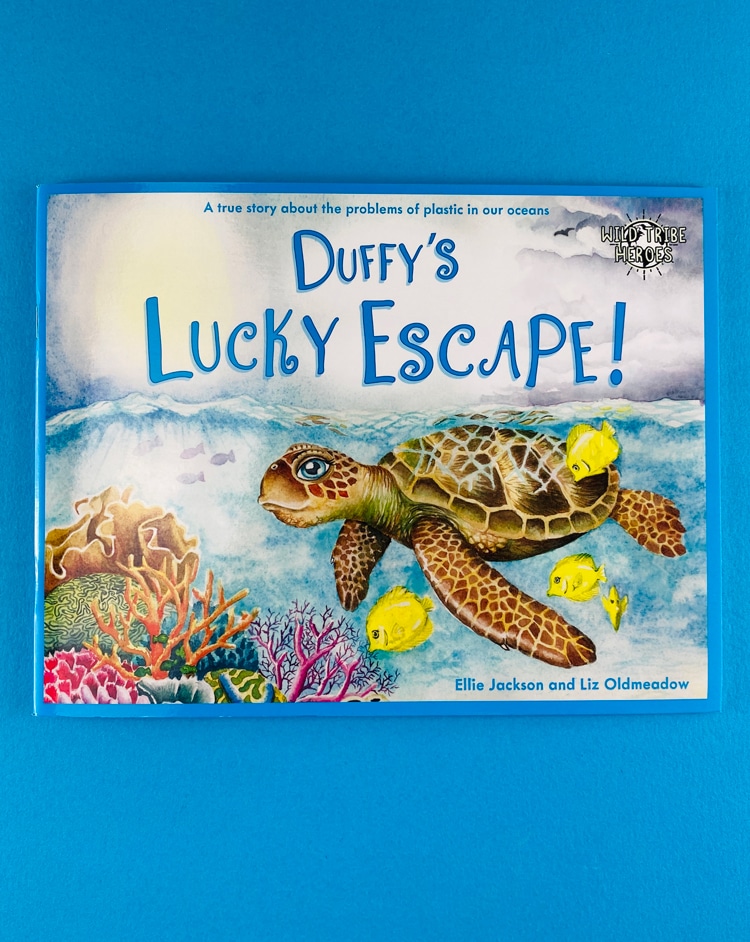
A reminder that you choose any custom size between A5 and A4. This flexibility opens up a myriad of possible options to tailor your book to a unique aesthetic that captures the buyer's attention and lends itself perfectly to the size of your text and illustrations. The Wild Tribe Heroes book here is 210x272mm.
Another option for a custom children's book size is 216x279mm which equates to the US Letter favourite of 8.5x11".
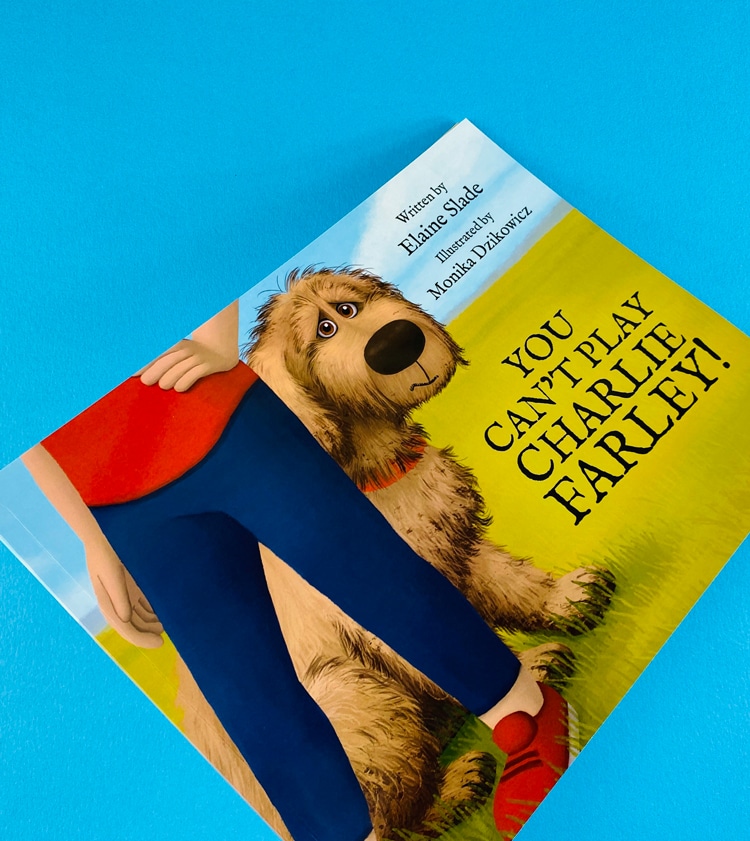
Hardcover versus Paperback Aesthetics
Diving further into the square book format, we take a look at Monster Tea Party and Troll's Amazing Day...Aren't the titles of kid's story books just the best! Both are 210x210mm but Monster is hardback and Troll's is soft back, perfect bound.
There is no right or wrong answer about which binding method and cover style to choose. It could be argued that you can charge a higher cover price for the hardback, but in turn, it is also more expensive to print.
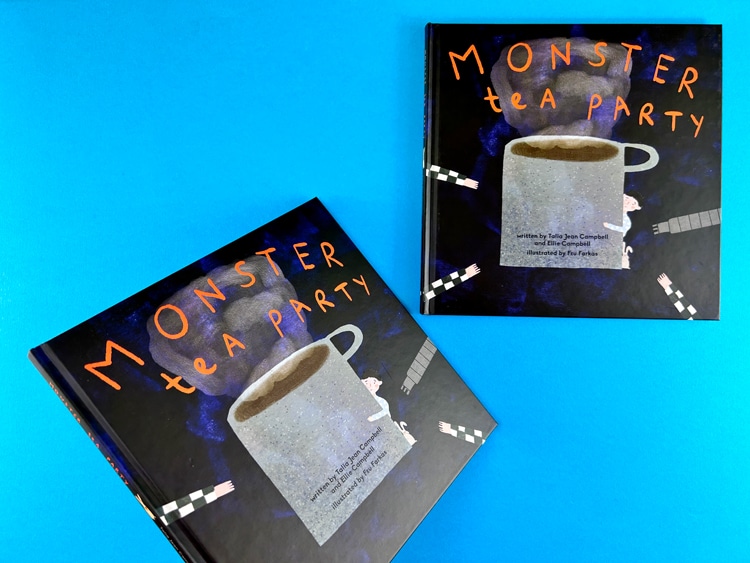
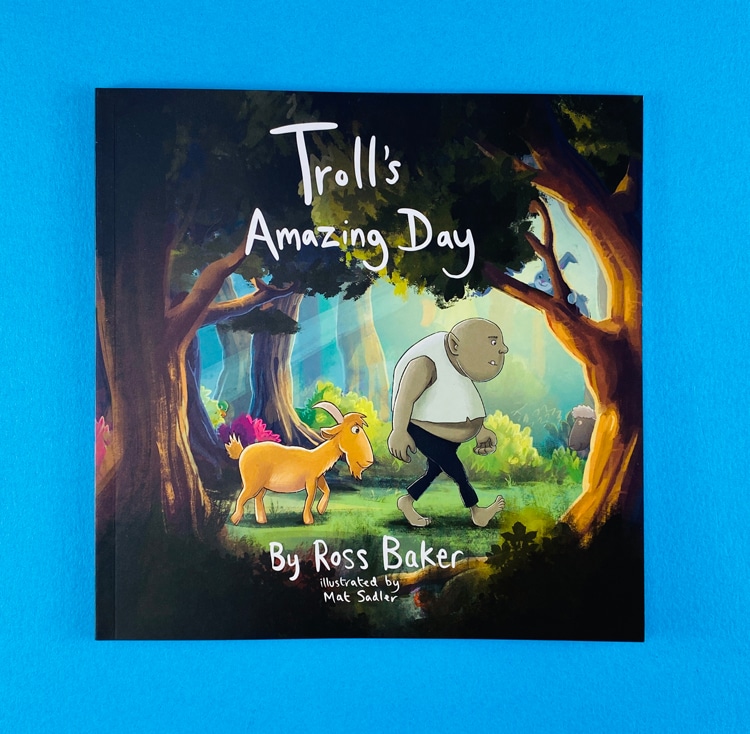
On the softback, the book has a trim size of 210x210mm. On the the hardback, there is a 3mm overhang on each side of the cover, so the inside pages are 210mm but the actual book ends up being around 216x216mm making it slightly more imposing.
Choosing a Binding Method for Children's Book Printing
Here is a short video discussing the 3 possibilities of saddle stitched (stapled), perfect bound and case bound (hardback). The page count does affect which options are available.
Binding Options For Your Children's Book
There are three main binding methods to choose from when printing a children’s book: saddle stitched, perfect bound, and case bound. The best option for you will depend on the page count and the overall aesthetic you’re hoping to achieve.
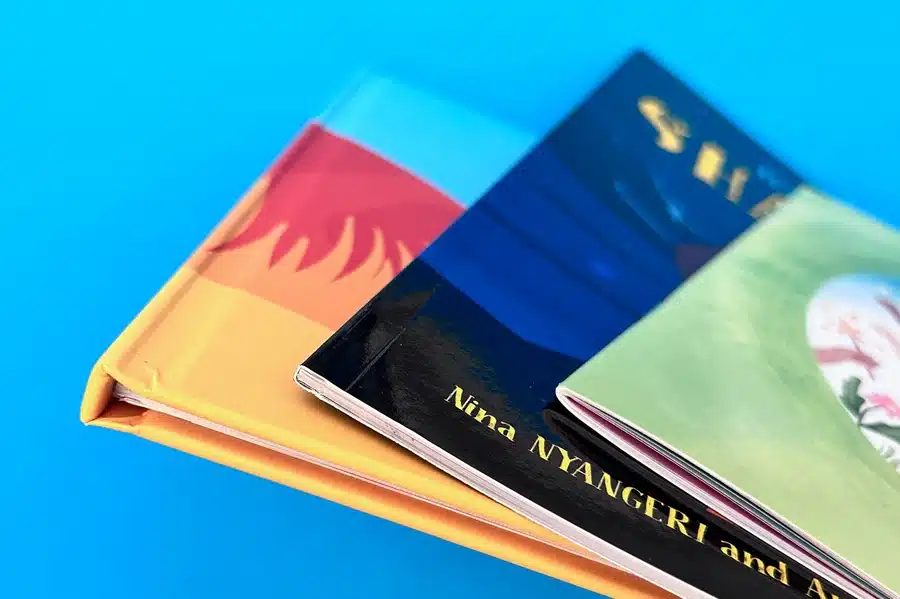
Saddle Stitched (Stapled)
Saddle stitched is the most cost-effective binding method and is a good option for books with a lower page count. A wire stitched book will lay completely flat, which is ideal for showcasing double-page spreads and illustrations. If you're considering an A3-sized booklet, keep in mind that there's a price increase at the A4 threshold due to the larger printing press required.
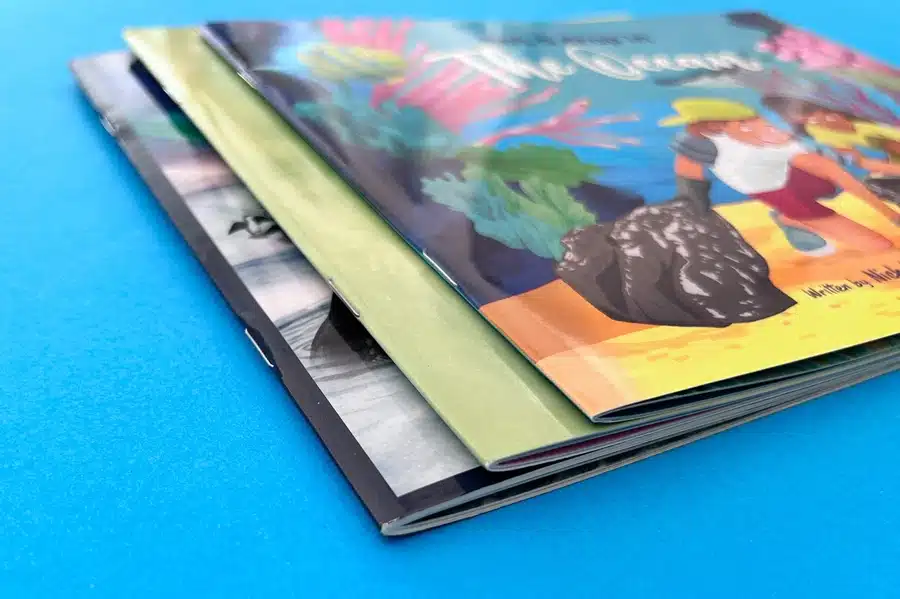
Perfect Bound
Perfect bound gives a more professional look than saddle stitched, and is the standard binding method for books with 40 pages or more. One thing to consider with perfect bound books is that you will lose 2-3mm in the spine gutter, which can slightly impact the visibility of double-page illustrations.
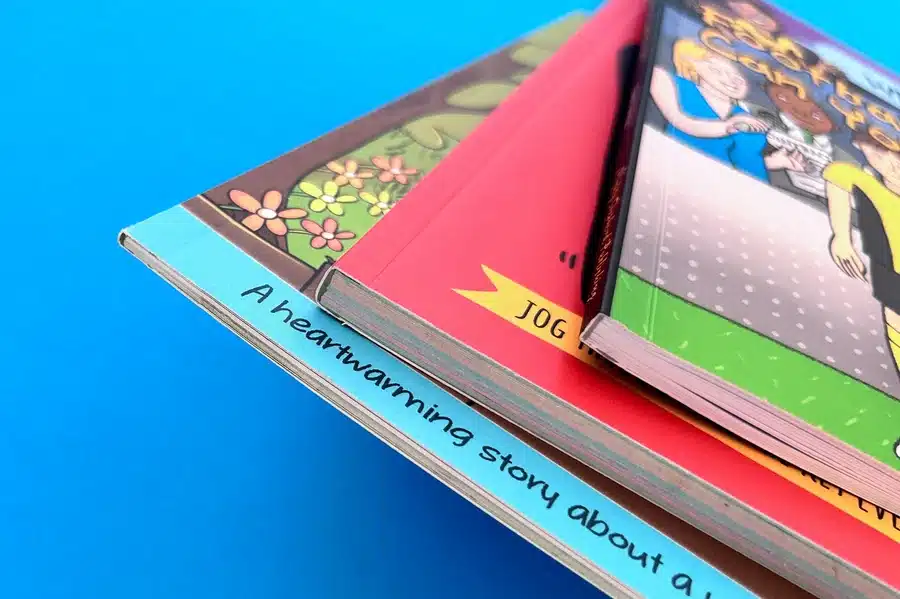
Hardback, Hard Cover or Case Bound
Case bound, also known as hardback, is the most expensive binding method, but it also produces the most durable and visually impressive book. Hardback books can command a higher cover price. You will need a minimum of 28 pages for a hardback book, plus the front and back covers, and optional endpapers. A hardback book will also be slightly larger than the specified trim size due to the cover overhang. For example, a 210 x 210mm book will actually be around 216 x 216 mm.
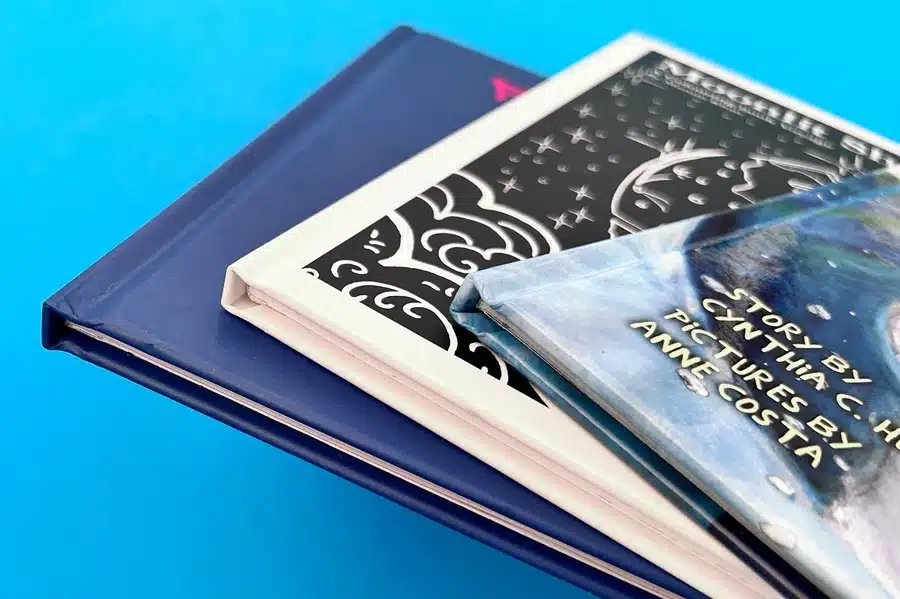
For a landscape book, you can go for any size from A5 up to and including A4. You can again, opt for a bespoke size such as 8 x 10 or 10 x 8, which are standard children’s book sizes. Taking a little bit off the height or width makes it more eye-catching for the reader and visually stimulating rather than the standard A size. A wire stitched kids book means the pages can be opened completely flat so you get the full benefit of the double-page spread for your spectacular illustrations and storytelling. On perfect bound storybooks, you do lose 2-3mm in the spine gutter so it is not possible to press the pages completely flat but this is the go-to and professional looking method of binding for 40 pages or more.
Consideration of Size Versus Binding Type
A3 Book Printing
There is slightly more scope on a portrait stapled booklet. You can choose any book page size from A6 (148x105mm) right up to A3 booklet printing (420mm high x 297mm wide). However, there is a price point cut off when you reach A4. Anything larger than A4, up to and including A3 has to be printed onto our B2 press which has higher setup costs. In turn, though, your storybook will be a hugely impressive size and can be sold for a higher cover price...although parents might need big muscles to lift it at bedtime!
For portrait perfect bound kid's book, then our size options are all sizes from A6 to A4 portrait.
A6 Children's Book Dimensions
A6 makes nice neat postcard size, smaller books that fit in your pocket. Think Postcard Size - that is A6. This can be sold for a lower cover price so might make for an instinctive purchase for potential readers at art fairs, in gift shops or when visiting your online store.
Made Your Choices?
If you have refined down the many options and chosen what would work for your next book. Jump on our Printed Project Builder, let us know the print spec and one of our friendly team will be back asap with a quote and an email packed full of information.
Need More Help?
We understand if this is your first book printing project then all the options can be a little daunting. Would it help if we sent you out a paper sample pack so you can see and feel the different options?
Or maybe some video help would let you visually work out which options would best suit your artwork and project. Our 1-2 minute showcase snippet videos on YouTube are ideal for this. We list the print spec, flick through a previous book printing project and you will immediately be able to decide if that style will work for your book.
How to Successfully Launch a Cohesive Series of Children’s Books
The image depicts a bright, cohesive series of children’s books that exude charm and playfulness. Launching a new range of children's books like this involves more than just storytelling; it's about creating a visual identity that young readers and parents can instantly recognise. The use of consistent design elements, such as a unified colour palette, similar typography, and a recurring style of illustration, ensures that each title feels like a part of a larger collection. This helps build brand loyalty, making it easier for children (and parents) to spot and collect every book in the series. The designs in this series, with characters like Joey, Roary, and Emy, are vibrant and friendly, inviting kids to join their adventures while parents appreciate the polished, high-quality print.
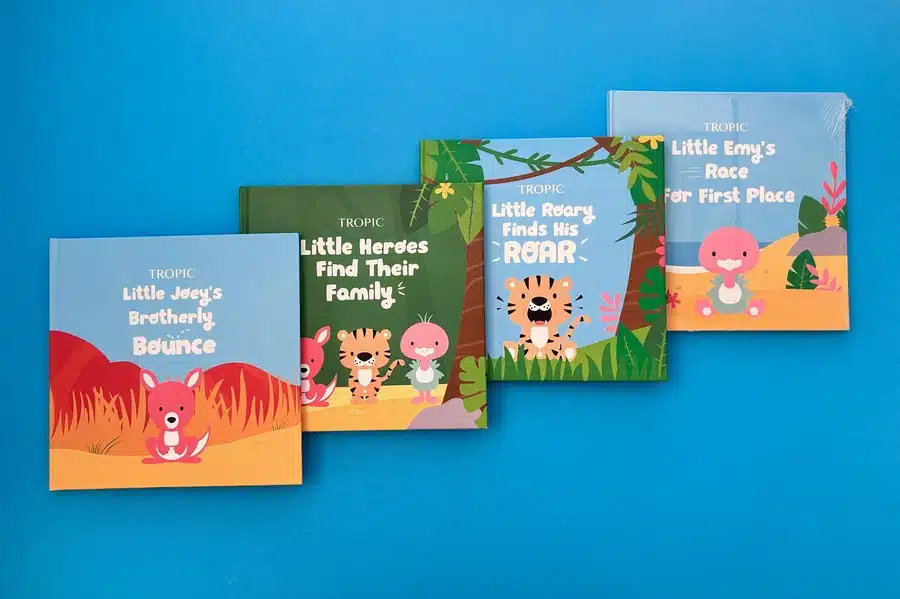
Actionable Insights for Designers
- Develop a Cohesive Design Template: Use a consistent layout across all titles in the series, including similar font styles, page structures, and colour schemes. This creates a sense of unity and makes it easier for readers to recognise the series.
- Engaging Illustrations: Illustrations should be colourful, simple, and expressive to capture children's attention. Consistent character designs help in creating memorable stories and maintaining brand continuity.
- Choose Durable, Child-Friendly Paper: Opt for thicker, durable paper that can withstand frequent handling by little hands. Consider matte finishes for a softer, child-friendly look and feel.
- Bright and Cheerful Colour Palette: Use a vibrant colour scheme that matches the tone of the stories. Bright colours are particularly appealing to children and help convey the fun, lively spirit of the books.
- Ensure Legibility with Child-Friendly Fonts: Choose fonts that are easy to read and age-appropriate. Consider using larger text sizes and a font that is clear and straightforward, which will help early readers follow along effortlessly.
A Deep Dive into Matt and Gloss Lamination on Book Covers
Here in ‘Oi Who Are You Calling Rubbish’ we have a full colour cover with matt lamination to give the books more longevity and black print on uncoated pages inside. Black line art which the children can spend time lovingly colouring in.
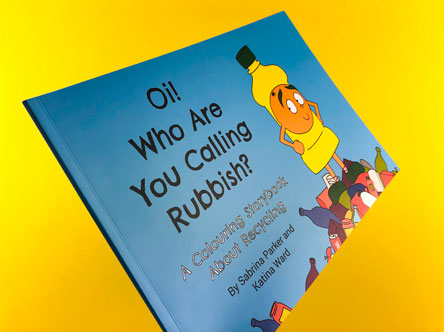
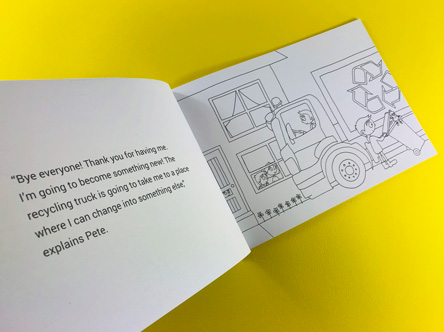
Paper does prefer to be laid flat and when you start folding paper in half to get the cover of your book, it will immediately start to crack. When it’s flat it is perfect, but when folded the fibres of the paper crack and this produces a white line and scuffed ink along the fold. The paper roughens up and it doesn’t look great.
So, we recommend laminating the front cover of books to prevent this happened. This lamination acts as a protective film over the front cover to stop it cracking meaning it arrives in pristine condition for the reader. You can choose from matt, gloss, anti-scuff or soft-touch.
Gloss lamination gives your colours real punch and vibrancy. Matt lamination is slightly more subdued with a smooth and professional-looking surface. Anti-scuff is used very rarely. Soft-Touch Lamination is probably more suited to corporate brochures with a velvet feel than it is to children’s books. We would suggest you go for matt or gloss on your new book.
The difference is subtle (at least on our photo 🙂 with "I'll Just Be Me!" having a slightly shinier gloss lamination while the 'Eddie' book behind has matt lamination for a more subtle, less intrusive finish.
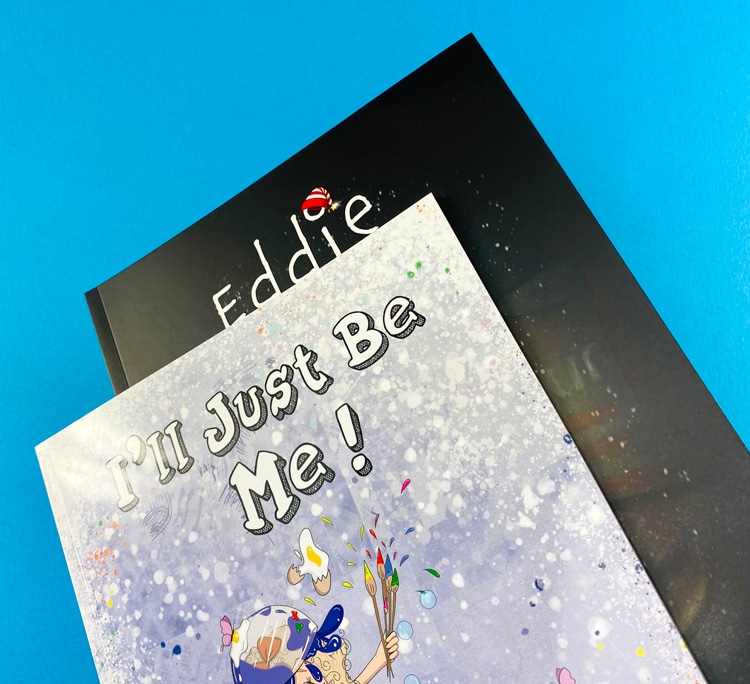
Premium finishes are the extra flourishes and premium extras you can add to the book cover making it really stand out. We offer a number of these and printing with gold foil isn’t the limit anymore – foiling comes in a range of up to 200 colours. You could also consider gloss spot UV varnish to a logo, title or vector illustration. How about embossing or debossing of the book title so it jumps towards the reader?
How to Order Your Book with Ex Why Zed
Our Print Journey is a great place to start. Depending on where you are up to, we have provided extensive guides at each stage.
The Ex Why Zed Print Journey
Once the design is completed and you are ready to print your children's book, get in touch with us and we’ll come back to you asap with a range of print quotes. You might not be a printing expert yet, but we will change that with our advice, setup guides and inspirational portfolio. Your artwork would look great on paper and the printing of a book journey is both full of learning and ultimately exciting at Ex Why Zed. Pdf to book printing is what we are print experts at, aiming to give you a pureprint reproduction of your artwork with our book design services. We offer digital printing for small runs and we are also litho printers for run lengths of 700 copies or more where that method becomes more friendly on your budget.
Ready to place an order?
Well done on getting your artwork ready for print! Now go ahead and upload the file/s using WeTransfer.com
It is super easy, free and you don’t need an account. Add hello@exwhyzed.com in the 'Email to' box. In the message area, tell us your print spec, number of copies you would like to print and the best address for delivery. We then get a download link with your files, simple as that!
Thank you for taking the time to read this blog post. If you have any questions do get in touch on hello@exwhyzed.com or call on 01206 76667 and we look forward to helping you transform your ideas into print!
Video Guides for Children's Book Sizes
A Video Guide on the Winning Solutions>>>
To watch our action packed, hour long video guide on Children’s Book printing then grab your drink of choice and a notepad >>>
Kids Book Sizes FAQs
Should I Work with Inches or Millimetres in Book Design?
When it comes to deciding whether to work in inches or millimetres for designing a children's book, there are a few factors to consider. According to expert book designers, millimetres tend to be the preferred unit of measurement due to their precision and accuracy. Millimetres offer a greater level of detail and control in terms of layout and sizing, which is especially important when designing for a younger audience. Additionally, many printing companies use millimetres as their standard unit of measurement, making it easier to communicate and collaborate with them throughout the printing process. Ultimately, the choice between inches and millimetres comes down to personal preference and familiarity with the units, but for those looking for a more precise and streamlined approach to book design, millimetres may be the way to go.
Is Your Printing As Good as Amazon KDP or Ingramspark?
We do have a steady stream of keen authors who arrive in our inbox with comments like:
"I have published a book with Amazon KDP and was also looking into signing up with IngramSpark. However my proof copy from both was not the quality I expected so am just looking at alternative options." Sue, self-published author.
"I am currently getting supplied through Amazon KDP. I have my first few events coming up where I am hoping to sell some and would like to step away from Amazon where the quality is questionable and inconsistent. Your prices seem very reasonable and I am keen to look into this further!" Sam, self-published author.
At Ex Why Zed we have the top of the range HP Indigo and Heidelberg litho presses so what comes off our machines will be the best your work can possibly look in print. We have over 250 happy reviews on Reviews.io, know the idiosyncrasies to look for in children's book structure and our friendly, expert team will help you on your Print Journey from day 1 until the books arrive.
Can You Help With My Book Layout?
We have complied a series of super helpful articles on finding a designer to work with you on the children's book structure. We understand file set-up and graphic design can be quite technical so the following insightful pages will help you research and approach a designer to artwork and layout your book.
Finding a Book Designer on Fiverr.
Finding a Book Designer on PeoplePerHour.
Top 10 Agencies to Design Your Book.
We've even done the heavy lifting on the design brief too so just copy and paste one of these in on an email to a few designers you like.
Design Brief for Children's Book Structure, Artwork and Layout.
Design Brief for Children's Book Illustration.
You're welcome 🙂
What Advice Do You Have For Promoting My Book on Social Media?
Here are 10 ideas to ensure your children's book get maximum exposure on social media:
- Create Engaging Videos: Utilise YouTube, the second largest search engine, to connect with your audience through videos that highlight your book's unique features.
- Use Hashtags Wisely: Choose relevant and trending hashtags to maximise your post reach on platforms like Instagram, Twitter, and YouTube.
- Engage in Conversations: Monitor and answer questions about your book to give your brand a personality and connect with potential readers.
- Host Contests and Giveaways: Attract new followers and appreciate existing ones by organising contests and giveaways.
- Network with Influencers: Follow and interact with influencers and authors who have succeeded in your niche to build valuable relationships.
- Share Reviews: Build trust by sharing testimonials and reviews from readers and industry experts.
- Build a Community: Stay active and engage with your followers to create a community of supporters around your book.
- Offer Pre-Order Discounts: Incentivise people to pre-order your book with special offers and discounts.
- Use Visual Content: Leverage images, book covers, and inside shots to visually promote your book.
- Share Behind-the-Scenes: Offering a glimpse into the writing and revision process can deepen your connection with your audience.
And there you have it! Ten sparkling ideas to make sure your children's book is the talk of the social media town. Good luck! ? Read more, on our article 10 Ideas to Promote Your Children’s Book on Social Media.
Children's Book Sizes, Some Key Statistics
If you’re targeting a young age group, like babies and toddlers age 0>3, you should rely heavily on pictures, rather than text.
While there are many factors that influence the cost of printing, page count is one of the biggest.
Over 250.76 million (yes, million!) children's books were sold in 2022. This compared with 201.9m in 2021 and 184.2m in 2020. So the market is growing and your new book would look great on the shelves too! (Sales figures from wordsrated.com)
The largest selling children's book of all time is The Little Prince by Antoine de Saint-Exupéry (published in 1943) is the best-selling children's book of all time, selling over 200 million copies. A quick look around on Google shows that it has been published many times in all manner of styles and iterations. Here are a few of the exquisite cover designs.


Once the design is completed and you are ready to print get in touch with us and we'll come back to you asap with a range of print quotes. You might not be a printing expert yet, but we will change that with our advice, setup guides and inspirational portfolio. Your artwork would look great on paper and the printing of a book journey is both full of learning and ultimately exciting at Ex Why Zed. Pdf to book printing is what we are print experts at, aiming to give you a pure print reproduction of your artwork. We offer digital printing for small runs and we are also litho printers for run lengths of 700 copies or more where that method becomes more friendly on your budget.
Thank you for taking the time to read this blog post. If you have any questions do get in touch on hello@exwhyzed.com or call on 01206 76667 and we look forward to helping you transform your ideas into print!
To watch our full action packed, hour long guide on Children's book printing then here is the magical link you will need:
Can You Print My Book in Full Colour or Black and White?
We either print your work in black ink throughout or in full colour where we use (four colour) CMYK inks to make up the millions of possible colours within the gamut. Full colour is going to give you far more impact for your images so they jump out at the reader. Black ink printing is cheaper because we are only using one ‘colour’. One example where you might want to print in black ink is for a colouring book. Colouring books are an increasingly simple way of illustrators getting their already completed artwork out there and bringing in some more money.
If you are looking to print a book featuring images that appear black & white or monochrome on screen but are actually in full colour then this is a crucial video for you to watch, absorb and act on.
Battle of printing black and white video.
It can be extremely hard to effectively print black-and-white images in digital print. Thankfully, this isn't our first rodeo so in the video below we take a deep dive into how to get around this and why it is so difficult. This is an issue that you will encounter at every printer but at Ex Why Zed we are keen to point it out and help before going ahead.

